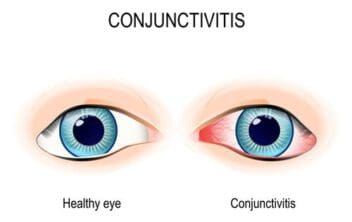Last Updated
Further Reading
Do Natural Remedies for Pink Eye Work?
Home / Eye Conditions & Eye Diseases / Conjunctivitis (Pink Eye) /
Last Updated
Although pink eye generally resolves on its own within a couple of weeks, natural remedies can be used to alleviate uncomfortable symptoms.
Natural remedies do not cure pink eye, but they can provide effective relief from pain, swelling, and redness caused by pink eye.
Pink eye is usually not cause for alarm, but some cases warrant a trip to the doctor. If your bacterial pink eye is not responding to antibiotics or you have intense redness or pain, for example, you should seek medical care.
How Effective Are Natural Remedies?

The National Eye Institute (NEI) explains that most instances of pink eye go away on their own and that home remedies offer effective ways for alleviating symptoms.
Usually, pink eye can be treated at home. Unless you have a severe case of bacterial pink eye, antibiotics will not be helpful.
Antibiotics do not have an effect on viral pink eye or pink eye that is caused by allergens or irritants. Viral pink eye is the most common type of conjunctivitis, and it usually clears up on its own within a few weeks.
Even in cases of bacterial pink eye, antibiotics may only slightly speed up the healing process. Bacterial pink eye also typically heals on its own.
Natural remedies offer safe and effective ways to address symptoms of pink eye. The time you have to wait for pink eye to clear up on its own can be uncomfortable and frustrating. Take advantage of the various home remedies available to alleviate discomfort while you give your eyes time to heal.
Treatment Options Vary for Different Types
The Centers for Disease Control and Prevention (CDC) explains that it is not always necessary to seek medical treatment for pink eye. Sometimes, the condition simply improves on its own without intervention. That being said, multiple treatment approaches are available for the various types of pink eye, including natural treatment options.
Treatment options vary according to the type of conjunctivitis.
- Viral conjunctivitis: Typically mild in nature, viral conjunctivitis usually clears up on its own within one to two weeks without any form of treatment. Tougher cases can take two to three weeks to clear completely. More serious forms of viral conjunctivitis can be treated with a prescription antiviral medication.
- Bacterial conjunctivitis: Mild cases of bacterial conjunctivitis can improve within two to five days on their own without the use of antibiotics, though they can take up to two weeks to go away completely. For more serious cases of bacterial conjunctivitis, antibiotics may be prescribed
- Allergic conjunctivitis: For conjunctivitis caused by allergens, such as pollen or animal dander, the allergen must be removed from the person’s environment and then the pink eye usually clears up. Allergy medications and eye drops can be used to alleviate symptoms.
If you are unsure about which type of conjunctivitis you have, speak with your doctor. They will be able to diagnose the type and prescribe the safest and most effective treatment approach.
Home Remedies for Pink Eye

Since most types of pink eye are likely to clear up on their own, you do not need to seek medical care automatically. There are a number of home remedies you can try to improve symptoms and alleviate discomfort.
Here are home remedies for pink eye, as recommended by the American Academy of Ophthalmology (AAO):
- Stop wearing contact lenses.
- Throw out used contact lenses, as they are likely infected.
- Stop wearing eye makeup.
- Take an over-the-counter painkiller to lessen pain and uncomfortable symptoms.
- Lubricating eye drops, or artificial tears, can be used to decrease discomfort.
- Place a warm compress, such as a warm, damp washcloth, on your eyes to ease discomfort and loosen dried mucus.
- A cool, damp washcloth placed on the eyes can relieve symptoms of allergic pink eye.
As you treat pink eye at home, it is important to prevent the spread of the infection to the other eye or other people. In order to avoid spreading pink eye, do the following:
- Use a fresh towel every day. Do not share towels with any other housemates.
- Use fresh washcloths each time you make a cold or warm compress.
- Change pillowcases and sheets every day.
- Wash hands frequently.
- Avoid touching your eyes.
- Do not share any items that come into contact with your eyes.
Pink eye can be highly contagious, so it is very important to be vigilant about how you address a pink eye infection. Basic hygiene measures are typically sufficient for preventing the spread of pink eye.
When to See a Doctor
While many cases of pink eye are likely to clear on their own in time and with the help of natural remedies, some cases do require medical intervention. The CDC urges individuals with pink eye to seek medical care if they are experiencing:
- Pain in the eyes.
- Blurred vision or sensitivity to light that does not get better after they have wiped any discharge away from the eyes.
- Intense redness in the eyes.
- Symptoms that get worse or do not improve within 24 hours of starting antibiotics, for people with bacterial conjunctivitis.
References
- About Conjunctivitis (Pink Eye). (January 2019). Centers for Disease Control and Prevention.
- Treatment for Pink Eye. (June 2019). National Eye Institute.
- Pink Eye Treatment. Stanford Health Care.
- Antibiotic Eye Drops Often Unhelpful for Pink Eye. (June 2017). The New York Times.
- Quick Home Remedies for Pink Eye. (October 2020). American Academy of Ophthalmology.
- Treatment of Acute Conjunctivitis in the United States and Evidence of Antibiotic Overuse: Isolated Issue or a Systematic Problem? (April 2017). Ophthalmology.
- Evaluation of Infectious Conjunctivitis by Clinical Evaluation and Novel Diagnostics. (October 2019). The Journal of Urgent Care Medicine.
- A Review of the Differential Diagnosis of Acute Infectious Conjunctivitis: Implications for Treatment and Management. (October 2019). Clinical Ophthalmology.
- Prevent the Spread of Pink Eye as Children Head Back to School. (September 2011). American Academy of Ophthalmology.
- Why You Are Probably Getting the Wrong Pink Eye Treatment. (June 2017). Kellogg Eye Center, Michigan Medicine.
The information provided on this page should not be used in place of information provided by a doctor or specialist. To learn more, read our Privacy Policy and Editorial Policy pages.